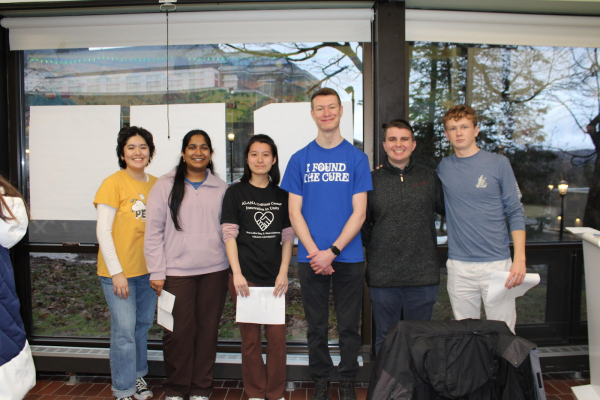The Art of Authenticity in Songwriting: A Review of Lana Del Rey’s Did you know that there’s a tunnel under Ocean Blvd
In a 2012 interview with The Telegraph, published shortly after the release of her widely acclaimed record “Born to Die,” Lana Del Rey shared the significance her contention with mortality has had on her life: “When I was very young I was sort of floored by the fact that my mother and my father and everyone I knew was going to die one day, and myself too. I had a sort of a philosophical crisis. I couldn’t believe that we were mortal.” Over ten years later, Del Rey continues to discuss death in her songs, and explores this topic along with familial anecdotes on her newest album, “Did you know that there’s a tunnel under Ocean Blvd” (DYKTTATUOB), in a manner that feels deeply personal when compared to her previous work.
From the album’s opening track “The Grants,” Del Rey – known originally as Elizabeth Woolridge Grant – employs her family’s surname in the title to establish their importance within the record immediately. She continues her struggle with mortality and memory by singing “My grandmother’s last smile (Ah) / I’m gonna take that too with me” in the song’s bridge to show how she keeps memories of the deceased alive. The singer wishes to make it clear from the beginning that family has an important role in her life, and the track’s gospel tones begin the series of various nods to Del Rey’s spirituality throughout the album.
No track is a more direct representation of the singer’s faith than “Judah Smith Interlude,” a four-minute and 36-second excerpt from a sermon of the megachurch preacher that also includes Justin Bieber in his congregates. For many listeners of Del Rey’s work, references to religion are nothing new and add a further layer of complexity to her art. In the song just before the interlude, “A&W,” Del Rey is singing about being the other woman, another common topic in her songs. At first glance, the artist’s songs are a walking contradiction to the “life dominated with lust” Smith is preaching against in his recorded excerpt. However, this track sequence can serve as yet another example of the dialectical nature of the singer’s work and public image that illustrates her ability to place her songs in conversation with one another. Perhaps by arranging puritanical messaging in proximity with its antithesis, Del Rey is highlighting one of the many reasons that make her music so appealing: her ability to expose the ideological contradictions within herself.
The singer’s recent release comes after a period of relative silence last year, which was a sharp contrast to her publishing of two albums in 2021, “Chemtrails Over The Country Club” and “Blue Banisters.” While these works undoubtedly carry gems, what makes DYKTTATUOB stand apart from her previous works is that it can hold its own amongst her discography whilst retaining the themes and elements central to her sound as well as writing. It hasn’t been since “Norman F*cking Rockwell” (NFR) that Del Rey has released a collection of songs that feel polished and distinct. In fact, the singer almost seems to acknowledge this with her inclusion of samples and a remix in her newest album from NFR.
Her sampling of the beat from the song named after her 2019 album in the latter half of “A&W” serves as a recall for fans not only in terms of melody but also ideas. She sings over the sample, “Your mom called, I told her, you’re f*cking up big time,” revealing she is still dealing with the “man child” she sang about nearly four years ago. The last few minutes of the album are dedicated to a trap remix of one of NFR’s most popular songs “Venice B*tch.”
In addition to giving listeners greater insight into her religious views, the singer is extremely candid about personal events and relationships. The album’s focus on death and family reaches its apex in “Fingertips” when Lana mentions how she nearly drowned in her teenage years, alluding to a suicide attempt, while simultaneously referencing the death of her uncle: “I wanted to go out like you, swim with the fishes / That he caught on Rhode Island beaches / But, sometimes, it’s just not your time.”
The intimacy of the album is further strengthened by one of the final tracks, “Margaret,” which presents as a dedication to the fiancée of one of the album’s producers and Del Rey’s long-time friend, Jack Antonoff. The track features Antonoff and the lyrics, “When you know, you know,” make it easy to imagine the song playing at the couple’s wedding in the near future. Del Rey once again takes us into her life and the lives of the people closest to her.
There are many cross-catalog tributes throughout the record, but one of the most noteworthy within the album is the call back to the mid-album track “Kintsugi” in the song “Let The Light In” near the work’s end. Throughout the chorus of “Kintsugi” the phrase “That’s how the light shines in” is repeated. Beyond its title, the chorus of “Let The Light In” asks the people in the song to do exactly that. Kintsugi is a Japanese practice of putting broken pottery pieces together with gold, a metaphor for how these tracks work together to tell the story of how Del Rey progresses in healing throughout the record. “Kintsugi” introduces us to the idea of the singer working on finding the beauty in putting the pieces back together and “Let The Light In” shows us that she’s trying – offering a realistic and empowering message for handling setbacks in one’s life.
Beyond its connection to an earlier track, “Let The Light In” brings brightness into the later portion of the album, whether that be in the subject matter or tempo of the songs. Known for her slow-paced ballads, Del Rey never fails to stun fans when she dabbles in heavier basslines and higher BPMs from time to time. “Fishtail,” “Peppers (feat. Tommy Genesis)” and “Taco Truck x VB” can be seen as the singer’s response to the fans that continue to demand that she infuse elements of hip-hop in her songs.
DYKTTATUOB, with its 16 tracks, provides something for everyone. Topics the artist has sung about for over the past decade continue to be fleshed out and new ones are uncovered. The record serves as a testament to Del Rey’s ability to be at her artistic best when singing about herself at her worst.

Heather Holm is a senior from Westlake Village, Calif., concentrating in political science. She has previously served as a Commentary Editor and a staff...








